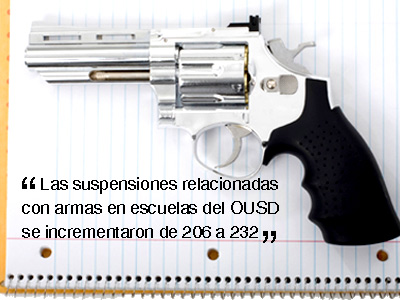
Teachers can't do their jobs in schools where students carry weapons, flaunt gang affiliation, menace classmates, and spout obscenities. If there's no discipline, there's no learning. Such is the case in too many Oakland schools, where Oakland Unified School District (OUSD) officials report that the superintendent is failing to make sure that students feel safe on campus. If this problem could be fixed, Oakland Unified might stop losing students and
the money that follows them. The increasingly unruly climate at many Oakland Unified schools is one of the chief reasons parents choose to put their kids in charter schools.In a report to OUSD's state administrator, district officials write that the superintendent (or the CEO in the corporate-speak of Expect Success) is not meeting the "operational expectation" of creating and enforcing "discipline policies to maintain safe and effective environments for all students and to promote civil behavior."
The California Healthy Kids Survey found that there was an 18 percent increase in gang affiliation among 7th graders between the 2005-06 and 2007-08 school years. The same survey found an 8 percent decrease fof school connectedness, which is defined by the California Department of Education as the degree to which students believe the school protefcts and cares for them.
The drop is not surprising. During the same time frame, weapons related suspensions at OUSD schools rose from 206 to 232. As OakBook reported last year, 9 percent of Oakland's 7th graders claim to have carried a gun to school at least once.
The surveys don't ask kids if they are afraid of being shot, but in 2008, 33 percent of 7th graders reported that they were afraid they would be beaten up at school, a figure that represents an 18 percent increase over the year before. More than one in three Oakland 7th graders said that they had been bullied at school. And on a 2007-08 survey conducted by Oakland Unified 32 percent of middle school students and 35 percent of high school students said they didn't feel safe at school.
District officials put it bluntly: "Although bullying is only one type of safety threat, the high rate of incidence in OUSD represents a significant barrier to learning for too many students. If adults fail to institute adequate systems and procedures for addressing the problem, these harmful threats and actions will increase, impacting attendance and academic performance."
Sometimes the crimes committed by students exceed the purview of school district discipline. "The data on the placement of students entering the District from the juvenile justice system indicates that of the 1,216 potential OUSD students arrested and released about 38 percent never reported to school after their release. The whereabouts of about 24 percent were unknown. Of the remaining 37 percent, greater than 8 percent leave school again before graduation."
However, the numbers do show some successes. For example, suspensions for profanity, vulgarity and obscenity dropped from 563 to 458 between the 2006-07 and 2007-08 school years.
